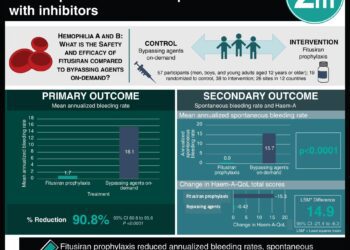siRNA against antithrombin alleviates symptoms of hemophilia [PreClinical]
1. Researchers developed a small interfering RNA (siRNA) molecule targeting antithrombin (AT) production, ALN-AT3, which reduced AT concentrations in mice and monkeys when administered subcutaneously.
2. Several animal hemophilia models showed that prophylactic treatment with ALN-AT3 resulted in decreased bleeding time, increased clot sizes, and greater thrombin production as compared to controls.
Evidence Rating Level: 2 (Good)
Study Rundown: Hemophilia is an inherited bleeding disorder characterized by a deficiency in clotting factor VIII (hemophilia A; HA) or factor IX (hemophilia B; HB). Both factors ultimately contribute to the production of thrombin, which in turn catalyzes fibrin clot formation. The most common hemophilia treatment is replacement therapy, where patients are intravenously administered clotting factors, either prophylactically or to manage active bleeding. Some patients, however, develop antibodies against the replacement factors, prompting the development of a different approach.
Previous studies have indicated that coexisting bleeding disorders that promote clotting, such as factor V Leiden, lessen the severity of hemophilia. With this idea in mind, researchers in this study developed ALN-AT3 to promote clotting by targeting production of AT, which generally opposes thrombin activity. Weekly dosages of ALN-AT3 appeared to lower AT levels for the duration of the 30-day experiment. Using a mouse model of HA, researchers found mice treated weekly with ALN-AT3 showed dose-dependent decreased clotting times and increased clot sizes in as compared to controls. HA mice treated with ALN-AT3 also had significantly improved survival times compared to untreated controls over a 26-week period, and no toxicity was found in HA mice across all ALN-AT3 dose levels. A similar non-human primate model of induced HA showed increased thrombin production in animals treated with ALN-AT3.
The novel approach used here to treat hemophilia circumvents the possibility of antibody production in response to replacement factors. Additionally, its subcutaneous availability and long-lasting effect suggest it may present a less invasive treatment method than current therapies. ALN-AT3 is in phase I clinical trials, in which it should be demonstrated the drug is safe and more effective than current treatment approaches.
Click to read the study in Nature Medicine
Relevant Reading: Factor V Leiden improves in vivo hemostasis in murine hemophilia models
In-Depth [animal study]: This study developed an siRNA against AT and then assessed its ability to decrease HA symptoms in mouse and monkey models of HA. Fluorogenic assays showed that depletion of AT from HA patient plasma led to increased thrombin levels in a manner dependent on depletion percentage. Combination of AT depletion paired with a standard dose of replacement factor did not elevate thrombin levels above normal levels.
To deplete AT in animals, researchers developed ALN-AT3, which delivers siRNA to hepatocytes, where AT is produced. The molecule targets a segment of the SERPINC1 transcript, which encodes AT and is preserved in rodents, monkeys and humans. Researchers began by examining ALN-AT3 pharmacokinetics and effects in wild type (WT) mice. While a single subcutaneous ALN-AT3 injection in WT mice resulted in undetectable levels of ALN-AT3 levels in plasma 4 hours later, liver levels remained detectable over multiple days. Consistent with this, nadir AT levels were achieved at around 10 days following a single dose of ALN-AT3. Repeated weekly dosages showed maintained lowered AT levels, with the lowest dose, 0.75 mg/kg, decreasing AT levels by ~80%.
Researchers then administered ALN-AT3 in mouse models of HA. HA mouse models showed 3 once-weekly doses of 3.0 mg/kg ALN-AT3 decreased coagulation times as compared to untreated mice (p<0.01, n=5 per group). In separate experiments, single doses (1-30 mg/kg) resulted in larger formed platelet and fibrin areas in treated mice when subjected to microvessel injury. High weekly doses (up to 30 mg/kg) decreased WT, but not HA mouse survival.
Large animal studies showed similar results to the mouse findings. Treating WT monkeys with 0.5 mg/kg ALN-AT3 weekly or 1 mg/kg biweekly for 8 weeks, followed by even lower weekly doses, resulted in stable 50-65% AT level reductions (n=3 per group). In monkeys injected with anti-factor VIII antibodies to induce HA, those treated weekly with 0.5 mg/kg ALN-AT3 showed greater peak thrombin levels as compared to untreated animals (p<0.01, n=4 per group).
Image: PD
©2015 2 Minute Medicine, Inc. All rights reserved. No works may be reproduced without expressed written consent from 2 Minute Medicine, Inc. Inquire about licensing here. No article should be construed as medical advice and is not intended as such by the authors or by 2 Minute Medicine, Inc.






![PET scans in early-stage Hodgkin’s lymphoma may help guide therapy [RAPID trial]](https://www.2minutemedicine.com/wp-content/uploads/2015/04/1280px-Hodgkin_lymphoma_cytology_large-75x75.jpg)
